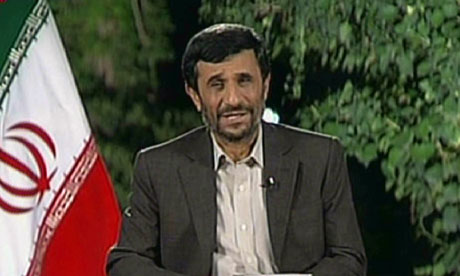Iran to launch Spanish-language television channel
Announcement by state television network shows regime wants to spread a message of legitimacy

Mahmoud Ahmadinejad in a still from Press TV, part of Iran's government mouthpiece broadcaster, IRIB. Photograph: AFP/Getty Images
Iran is to reach out to Latin America with a Spanish-language television channel to explain the "ideological legitimacy" of the Islamic system.
"As half of the world's population speaks Spanish we will start a network within the next few months," Ezatollah Zarqami, the head of Iran's state television network, IRIB, announced in Tehran.
IRIB broadcasts in Arabic, English and other languages – as well as Farsi. It has repeatedly been accused of illegally jamming broadcasts into Iran it dislikes, most notably of BBC Persian TV and the Voice of America in Farsi.
"This new Spanish network will have a major role in reflecting the ideological legitimacy of our system to the world," Zarqami told prayer leaders.
IRIB is the principal mouthpiece of the Iranian state. One of its five channels, English-language Press TV, which has a large bureau in London, is described as intended to break the "stranglehold" of the west over world media. It claims to provide "accurate and unbiased coverage" of Middle East events.
Al-Aalam broadcasts in Arabic and was launched around the time of the US invasion of Iraq in 2003. This month Iran launched iFilm, a 24-hour Arabic satellite TV entertainment channel for Lebanon, Syria and the United Arab Emirates.
The move to Spanish broadcasting reflects a growing sense in Iran that it needs to use "soft power" to overcome what it sees as hostile media coverage and combat what it sees as the double standards of the US and other western governments.
The Iranian president, Mahmoud Ahmadinejad, and other Iranian officials have accused western news organisations of exaggerating the significance of issues such as the sentence of death by stoning imposed on a women accused of adultery and murder.
Latin America may be seen as fertile ground because of the good relations between Iran and countries such as Venezuela, Ecuador and Bolivia. Portuguese-speaking Brazil also has ties to Tehran. Ahmadinejad visited Bolivia, Venezuela and Brazil in November 2009.
Tehran uses satellites to broadcast its own TV programmes abroad but it is still illegal to have satellite receivers inside the country, where officials denounce the "cultural decadence" spread by foreign channels. In recent years many Iranians have discreetly installed satellite TV in their homes but these are the target of sporadic crackdowns by police who confiscate illegal dishes.

No comments:
Post a Comment